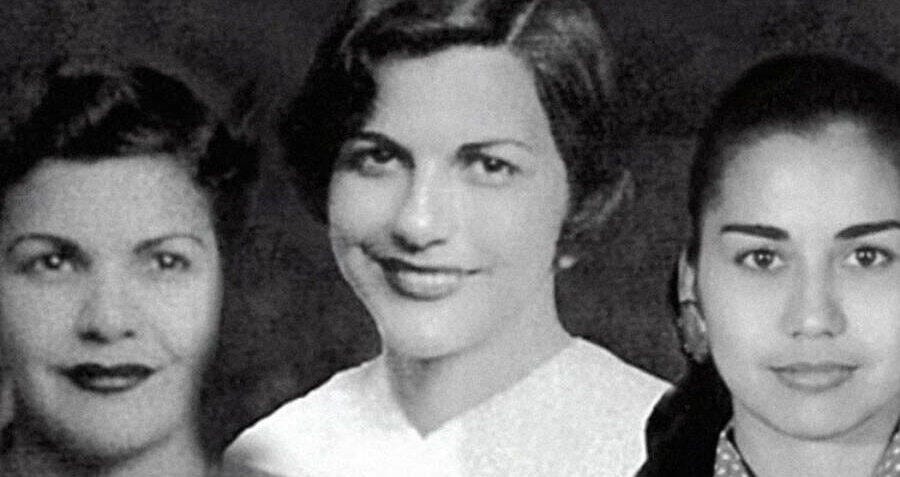Their names were Patria, Minerva, and María Teresa. Dominicans fighting for a brighter future, for a better tomorrow. They were on the frontline, leading the charge against a powerful force that sought to silence them. Unmoved by fear, their determination burned like an unyielding flame. But tragedy struck, their lives taken before their time. However, their legacy lives on, serving as a beacon of hope, reminding us that the fight for justice must continue, even in the face of adversity.
“What matters is the quality of a person. What someone is inside themselves:” A Look at the Mirabal Sisters’ Powerful Words and Enduring Legacy
The Mirabal sisters, affectionately called “Las Mariposas” (the butterflies) by those who loved them, were extraordinary Dominican women who bravely stood up against the brutal dictatorship of Rafael Trujillo. This quote, emphasizing inner strength and character, offers a glimpse into the heart of their fight. They weren’t focused on appearances or social standing; they cared about justice, fairness, and the inherent value of every human life.
Living under Trujillo’s regime meant enduring a suffocating reality where expressing one’s opinion could have dire consequences. Yet, the Mirabal sisters refused to be silenced. They spoke truth to power, advocating for basic human rights and inspiring others to join their cause. Their bravery, fueled by an unwavering belief in human dignity, shone as a beacon of hope in those dark times.
Their activism wasn’t limited to words; it was a call to action. Risking their lives, they formed a resistance group, distributing pamphlets and organizing clandestine meetings. Despite knowing the risks and potential consequences, their commitment to freedom never wavered. While their struggle ultimately led to their tragic assassination, it ignited a fire in the hearts of the Dominican people.
The Mirabal sisters’ legacy extends far beyond their heartbreaking deaths. Their courage likely played a crucial role in finally toppling Trujillo’s regime, proving that even the most oppressive forces can be overcome. They became powerful symbols of resistance, not just in the Dominican Republic, but across the globe, inspiring artists, writers, and activists to this day.
Their story, documented in books, films, and countless research papers, explores their lives, their fight, and the ripple effects of their sacrifice. The Mirabal sisters are more than historical figures; they are a testament to the resilience of the human spirit, reminding us that even facing overwhelming adversity, hope can prevail. From their childhood in the small town of Ojo de Agua to their unwavering fight for freedom, the Mirabal sisters left an indelible mark on Dominican history and the world. Their belief in the power of virtue, of inner strength and goodness, serves as a powerful inspiration to fight for what is right, no matter the cost.
How did the Mirabal Sisters impact the Dominican Republic?
The Mirabal sisters’ fight against Rafael Trujillo’s dictatorship was deeply personal. They lived under a cloud of fear, knowing that speaking out could mean vanishing in the night. But they refused to be silenced. Their bravery in the face of such danger helped to awaken the conscience of the Dominican people, demonstrating that resistance was possible and tyranny was not an inevitable fate.
Their tragic assassinations in 1960, orchestrated by Trujillo’s regime, sent shockwaves through the Dominican Republic and beyond, unleashing a wave of outrage that had previously been suppressed by fear. This groundswell of public anger, coupled with intensified international pressure, weakened Trujillo’s grip on power. While historians debate the exact degree to which their deaths directly caused Trujillo’s downfall six months later, their martyrdom undoubtedly played a crucial role. The brutality of the act, silencing voices that had dared to speak truth to power, exposed the true nature of his regime to the world.
The Mirabal sisters’ legacy extends far beyond their role in toppling a dictator. They’ve become potent symbols of resistance against tyranny and violence against women, not just in the Dominican Republic but globally. Their story resonates with struggles for freedom and justice everywhere.
The image of four young women, mothers and daughters, willingly facing danger to fight for a better future is a powerful one. Their courage serves as a beacon, reminding us that ordinary people can achieve extraordinary things when they stand up for what they believe in. They left behind a powerful message: even in the face of overwhelming odds, hope can blossom, and change is possible.
While the specifics of their involvement in underground movements are still being unraveled by historians, the impact of their sacrifice is undeniable. Their story serves as a stark reminder of the human cost of oppression and the courage it takes to fight for freedom. It encourages us to remember those who risk their lives for justice and to continue the fight against all forms of tyranny.
What is the quote in the Time of the Butterflies about revolution?
In Julia Alvarez’s poignant novel, “In the Time of the Butterflies,” the Mirabal sisters’ struggle against a brutal dictatorship is brought to life. Their fight was marked by powerful words that continue to resonate today, and one quote, in particular, uttered by the fiery Minerva Mirabal, encapsulates the essence of their struggle:
“There is no freedom without sacrifice, and no revolution without bloodshed.”
This statement reflects the harsh realities that these women faced every single day. Minerva doesn’t sugarcoat anything. She acknowledges that the path to a better world is often paved with loss and pain. But she’s also making a powerful statement: these sacrifices are unavoidable if you’re truly committed to achieving justice and equality.
The Mirabal sisters – Patria, Minerva, and Maria Teresa – lived this quote. They rebelled against Trujillo’s iron-fisted rule, even when it meant facing imprisonment, violence, and the very real threat of death. Their unwavering commitment to a brighter future, even in the face of such danger, is incredibly inspiring.
Their story continues to resonate with people fighting for change all over the world because it serves as a sobering reminder that the struggle for freedom is rarely easy or bloodless. It demands courage, resilience, and an unshakeable belief in the power of collective action.
While some scholars might debate the nuances of revolution and the complex factors that contribute to social change, the core message of the Mirabal sisters remains a powerful touchstone. Their legacy reminds us that achieving meaningful progress often requires facing difficult truths and making profound sacrifices.
What is the quote in the Time of the Butterflies about gender roles?
The Mirabal sisters – Patria, Minerva, and María Teresa – became symbols of resistance against Rafael Trujillo’s dictatorship in the Dominican Republic. But their fight wasn’t just about political freedom; it was about breaking free from the traditional roles that society placed on women.
The quote, “Women’s emancipation is not a gift, it must be conquered,” perfectly sums up their belief that women shouldn’t wait for permission or handouts to achieve equality. They believed true freedom had to be fought for and earned.
In the Dominican Republic of that era, patriarchal norms were deeply entrenched. Men held the power, and women were largely expected to be wives and mothers first. By speaking out against injustice and demanding equal rights, the Mirabal sisters directly challenged this system. Their actions were a threat to the established social order because they dared to envision a world where women had a voice and agency.
What’s even more inspiring is that they refused to back down, even when faced with constant threats and persecution. Imagine trying to balance your own personal life – being a wife, a mother – with the very real dangers of political activism. It couldn’t have been easy, but it shows just how strong and resilient the Mirabal sisters were. They refused to let societal expectations stop them from fighting for what they believed in.
Their story is a reminder that women’s lives are multifaceted. We can be mothers, wives, sisters, friends, AND powerful advocates for change. The Mirabal sisters’ legacy continues to inspire women around the world to fight for their own emancipation, to break down the barriers that hold them back, and to strive for equality in every aspect of life.
Their courage shows us that even in the darkest of times, the human spirit – and the power of collective resistance – can shine through. The Mirabal sisters remind us that change doesn’t happen by chance; it happens when courageous individuals, regardless of gender, stand up and demand it.
Who are the Mirabal Sisters of the Dominican Republic?
The Mirabal sisters – Patria, Minerva, and María Teresa – were three Dominican women who risked everything – their safety, their families, even their lives – to stand up against Rafael Trujillo’s dictatorship in their country. They refused to accept Trujillo’s oppressive rule and were determined to fight for justice and freedom.
They were known as “Las Mariposas,” meaning “The Butterflies” in Spanish, a fitting tribute to their grace, strength, and the hope they brought to the Dominican Republic. These women didn’t simply protest quietly; they actively organized protests, disseminated information through secret leaflets, and even participated in risky, undercover operations against the regime. They were thorns in Trujillo’s side, and he was not pleased.
Tragically, their bravery came at a high cost. In 1960, the sisters were brutally murdered. While the official story attempted to cover it up, it was widely known that Trujillo was behind the act. This horrific event sparked outrage across the Dominican Republic and internationally, contributing to Trujillo’s own downfall just a few months later.
The Mirabal sisters didn’t die in vain. They became powerful symbols of resistance, especially for women fighting against oppression and violence. In their honor, the United Nations declared November 25th as the International Day for the Elimination of Violence against Women. It’s a day to remember the Mirabal sisters and to continue their fight for a world free from fear and violence.
Their story, though incredibly tragic, continues to inspire artists, writers, and activists around the world. They remind us that even in the face of danger and oppression, courage and hope can bloom. If you’re interested in learning more about these extraordinary women, Julia Alvarez’s novel “In the Time of the Butterflies” (1994) beautifully captures their essence.
What was Minerva’s quote In the Time of the Butterflies?
Minerva Mirabal, one of the courageous Mirabal sisters, once said, “What matters is the quality of a person. What someone is inside themselves.” In a world where a dictator like Trujillo tried to control everything, Minerva was highlighting the one thing he couldn’t touch: a person’s inner character.
This wasn’t just a nice thought for Minerva; it was a deeply held belief that fueled her fight against Trujillo’s oppressive regime. She saw the inherent worth in every person, regardless of their gender or social standing. This belief likely motivated her passionate fight for women’s rights, education, and freedom.
Minerva’s words weren’t just about her own struggle; they became a source of strength for countless others. They were a reminder that even in the darkest times, the human spirit has the power to resist, to hope, and to fight for a better future. That’s why even today, Minerva is remembered as a “Butterfly” – a symbol of transformation and the power of courage.
In a world that often judges us by appearances, Minerva’s words are a powerful reminder to look deeper, to see the value in ourselves and others, and to never stop fighting for what’s right.
What did Trujillo say about the Mirabal sisters?
The Mirabal sisters, nicknamed “the Butterflies,” were a persistent thorn in the side of Rafael Trujillo’s iron-fisted rule in the Dominican Republic. Their activism made them such prominent figures in the resistance movement that Trujillo himself supposedly declared, “The only obstacles left are the Catholic Church and the Mirabal sisters.” This statement alone speaks volumes about the threat they posed to his power.
Tragically, Trujillo’s paranoia proved to be accurate. He saw the Mirabal sisters’ growing influence as a direct challenge to his authority. This fear, combined with his ruthless nature, likely led to their brutal assassination in 1960. The sisters were ambushed and murdered by Trujillo’s secret police, sending shockwaves throughout the Dominican Republic and beyond.
However, Trujillo’s attempt to silence them backfired spectacularly. The Mirabal sisters’ deaths didn’t crush the resistance; they ignited it. Public outrage fueled the flames of opposition against Trujillo’s regime. Their martyrdom became a rallying cry, a symbol of defiance against tyranny. Ultimately, the sisters’ sacrifice contributed to Trujillo’s own downfall when he was assassinated just a year later.
The legacy of the Mirabal sisters, those courageous “Butterflies,” extends far beyond the borders of the Dominican Republic. Their story serves as a powerful reminder that even in the face of immense danger, courage can bloom. It highlights the impact ordinary people can have when they stand up for what’s right, even when it means risking everything. The Mirabal sisters stand as a testament to the idea that resistance, however small it may seem, can spark change and inspire generations to come. They remind us that the fight for justice and freedom requires unwavering courage and that the sacrifices made by those who fight are never in vain.
How did Rafael Trujillo affect the Dominican Republic?
Rafael Trujillo’s iron fist held sway over the Dominican Republic for over three decades, leaving a lasting impact on the nation’s political, social, and economic landscape. His dictatorship was characterized by human rights violations, the silencing of dissent, and a pervasive cult of personality.
Political Repression:
Trujillo’s regime was built on fear and intimidation. Political rivals were silenced through a vast network of secret police who employed imprisonment, torture, and extrajudicial killings. This created an atmosphere of fear that permeated all aspects of Dominican life.
Economic Exploitation:
Corruption was rampant under Trujillo’s rule. He used his position to amass personal wealth, turning the country’s resources and industries into his personal piggy bank. This widespread corruption led to rampant poverty and inequality, benefitting Trujillo and his cronies at the expense of the Dominican people.
Propaganda and Social Control:
Trujillo understood the power of propaganda. He tightly controlled the media and education system, using them to disseminate his version of events and create a cult of personality around himself. This manipulation of information made it difficult for Dominicans to access unbiased news or express dissenting views.
Lasting Legacy of Fear:
Even after Trujillo’s assassination in 1961, his legacy of fear and repression continued to cast a long shadow over the Dominican Republic. Many Dominicans, even generations later, still hesitate to criticize the government, a direct result of the trauma inflicted during his reign.
The Dominican Republic Today:
While Trujillo’s reign of terror finally ended, the Dominican Republic is still grappling with its legacy. The country has made strides towards democracy and human rights, but the scars of Trujillo’s dictatorship serve as a reminder of the fragility of freedom and the importance of vigilance in safeguarding democratic institutions.
It’s important to note that this is just a brief glimpse into a complex and brutal period in Dominican history. There’s much more to uncover about Trujillo’s reign and its aftermath. Further exploration of different perspectives and historical accounts is encouraged to gain a deeper understanding of this fascinating and tragic chapter.
What was the legacy of the Mirabal sisters?
The Mirabal sisters’ story doesn’t end with their tragic deaths. Their impact continues to resonate, transforming them into powerful symbols of resistance, particularly for women. They stood up to a dictator, fought for their beliefs, and championed women’s rights in a time when doing so was incredibly dangerous.
Their bravery, especially in the face of Trujillo’s cruelty, resonated deeply with people. Their assassination served as a wake-up call, igniting outrage that fueled the movement against Trujillo. Some historians even suggest that their deaths were a turning point, the moment the tide turned against the dictatorship. While it’s difficult to definitively prove causation, their deaths undoubtedly exposed the brutality of Trujillo’s regime and empowered the opposition.
Their legacy extends beyond the toppling of a dictator. These women were passionate about equality and believed that women deserved the same rights and opportunities as men. They challenged traditional roles, advocating for women’s education, voices to be heard, and empowerment. Their message continues to resonate with women today, inspiring them to fight for their own rights and break down barriers.
Their influence is felt globally. The United Nations, in their honor, declared November 25th, the anniversary of their deaths, as the International Day for the Elimination of Violence against Women. This day serves as a reminder not only to remember their sacrifice but also to reaffirm our commitment to fighting for a world where all women are safe and respected.
The Mirabal sisters’ story – three women from a small country who dared to confront a dictator and became global icons for justice and equality – is a powerful reminder that ordinary people can make an extraordinary difference.
What did the Dominican Sisters Do?
The Mirabal sisters – Patria, Minerva, and María Teresa – weren’t just fighting against Rafael Trujillo; they were fighting for a better Dominican Republic. Recognizing the oppressive nature of Trujillo’s regime, particularly toward women, they decided to take a stand. It took immense courage to speak out against a dictator when even whispering his name could have deadly consequences. Yet, this is the bravery that the Mirabal sisters, nicknamed “Las Mariposas” (The Butterflies), embodied.
Joining the underground Movement of the Fourteenth of June, a group secretly working to overthrow Trujillo, the sisters risked their lives to bring about change. Minerva, the eldest, was a natural leader, unafraid to speak her mind and inspire others with her passion and determination. Patria and María Teresa, the younger sisters, were equally passionate, finding ingenious ways to resist, such as spreading clandestine messages and ensuring vital information reached the right people. They believed in a world where everyone could live with freedom and dignity, and they were willing to risk everything for that belief.
What makes their story even more remarkable is that these women were also mothers and wives. They understood the risks, not just for themselves, but for their families as well. Yet, their commitment to justice never wavered, suggesting that even in the darkest of times, courage can bloom, inspiring us to stand up for what is right, however difficult.
Sadly, their bravery came at a steep price. Their activism made them targets, and in 1960, Trujillo’s regime brutally assassinated them. Though they likely knew the risks, the Mirabal sisters refused to be silenced. Their deaths sparked outrage and fueled the fire for change. In many ways, their sacrifice helped to achieve what they fought so hard for: Trujillo’s dictatorship crumbled just a few months later.
While their story is rooted in a specific time and place, the message of the Mirabal sisters continues to resonate today. Their story reminds us that change often comes at a cost but that ordinary people can achieve extraordinary things through courage, perseverance, and a belief in a better future.
What were the accomplishments of the Mirabal sisters?
The Mirabal sisters – Patria, Minerva, and María Teresa – didn’t simply fight against one man; they fought against an entire system designed to oppress women. Imagine living in a time when expressing your opinion could lead to your death, where disagreeing with the ruler meant endangering your loved ones. That was the reality for women in the Dominican Republic under Trujillo’s rule.
These women weren’t born revolutionaries. They were daughters, sisters, wives, and mothers who witnessed firsthand the injustice perpetrated by Trujillo’s regime. They saw how he silenced dissent, crushed anyone who dared question his authority, and they knew they could not remain silent.
Joining resistance groups like the Movement of the Fourteenth of June, named after the date of a massacre of Dominicans who opposed Trujillo, they risked their lives distributing pamphlets, organizing meetings, and raising awareness about Trujillo’s atrocities. It’s difficult to fathom the courage it takes to stand up to a dictator, knowing the potential consequences: imprisonment, torture, even death.
The Mirabal sisters became symbols of hope, beacons of resistance in a time of pervasive fear. Their bravery, however, came at a terrible cost. They were imprisoned, tortured, and ultimately, assassinated by Trujillo’s regime. Yet, their deaths sparked outrage and fury throughout the country, marking a turning point. People who had been silenced for decades found their voice, and the movement against Trujillo gained unstoppable momentum, leading to his assassination and the end of his brutal reign.
The Mirabal sisters’ legacy transcends Dominican borders. Their story reminds us that even in the darkest of times, courage can prevail and that ordinary people can achieve extraordinary things when they stand up for their beliefs. The United Nations recognized their impact by designating November 25th, the day of their assassination, as the International Day for the Elimination of Violence against Women.
While historians debate the finer points of their activism and its direct impact on Trujillo’s downfall, one thing remains clear: the Mirabal sisters’ bravery resonated deeply, transforming them into enduring symbols of resistance. Their story is a stark reminder that the fight for equality is ongoing and that their sacrifice continues to fuel the pursuit of a just world free from violence and oppression.
The Mirabal Sisters: A Legacy of Courage and Resistance
Beyond the historical events, the Mirabal sisters embody a timeless message of courage, resilience, and the pursuit of justice. Their legacy continues to inspire activists, artists, and individuals around the world, reminding us of the power of ordinary people to create extraordinary change. As we delve deeper into their story, we uncover not only their remarkable lives but also the enduring impact their fight for freedom and equality has had on the Dominican Republic and beyond.
- Star Ring Trends: Etsy vs Amazon - March 28, 2025
- Boost Pollinator Habitats: Baby Blue Eyes Sustainable Farming Guide - March 28, 2025
- Protect Big Black Bears: Effective Conservation Strategies - March 28, 2025

















2 thoughts on “How did the Mirabal Sisters impact the Dominican Republic?”
Comments are closed.